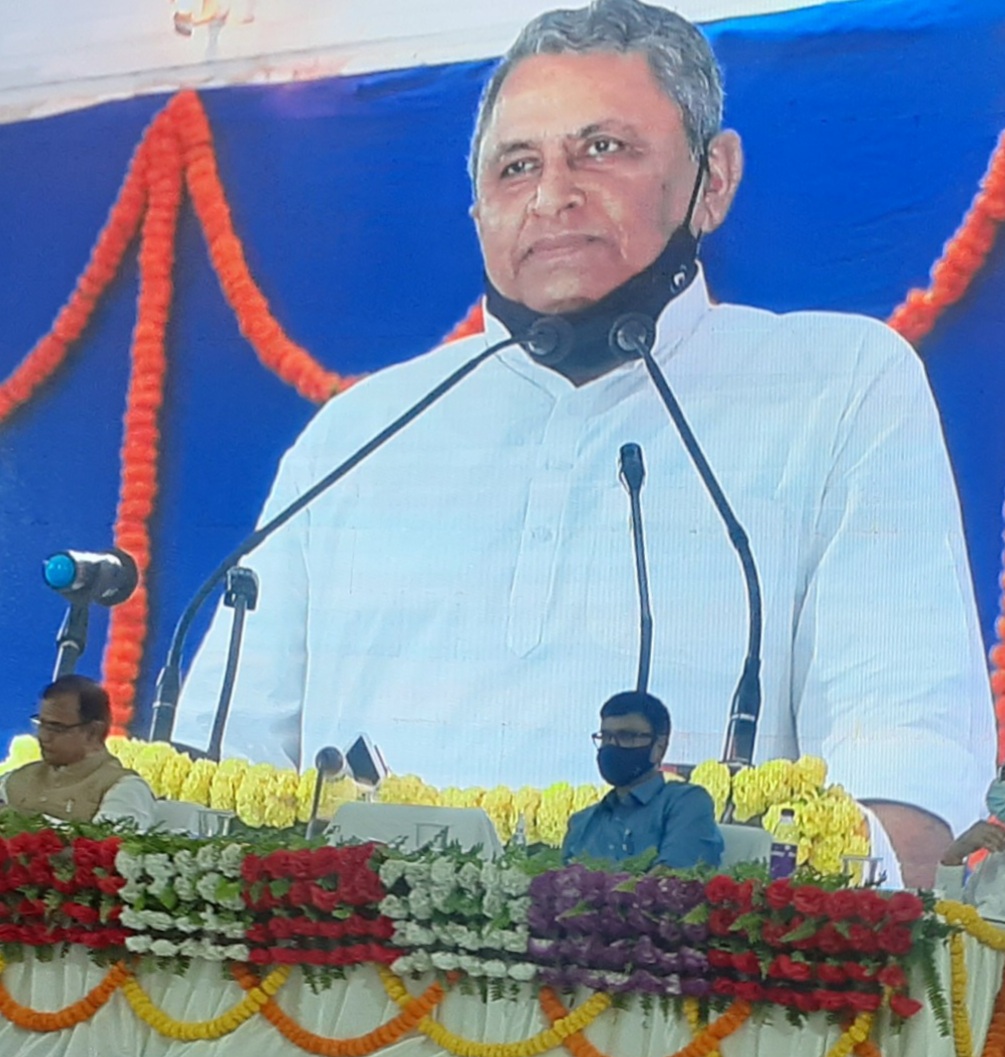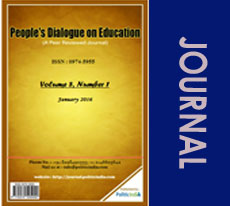Making Some Issues Out of the 105th Foundation Day Celebration of Patna University
- Post By PoliticIndia.com on
- 03/Oct/2021

Khagendra Kumar
Patna University celebrated its 105th foundation day on the 1st of October, 2021. As many as 41 toppers of various undergraduate programmes were awarded gold medals. In bagging the gold medals, girls outnumbered the boys with a ratio of 32:9. This was described by the chief guest on the occasion, Shri Vijay Kumar Choudhary, Education Minister of Bihar as a clear indication of the fulfillment of his government’s efforts towards the empowerment of women. Another guest on the occasion Shri Sanjay Kumar, Additional Chief Secretary in the Dept. of Education, Govt. of Bihar described the bagging of maximum awards to the girls as asymmetrical and indicated towards required correction.
Very often I criticize bureaucracy and blame it for the present crisis of school and university education of Bihar. But here is a bureaucrat whose concern needs to be taken seriously. While all others were busy in appreciating the asymmetrical achievement of students which appears to be natural after prolonged domination of male students the trend is reverting. But the concern of a visionary bureaucrat is genuine as he perhaps does not want the system to continue with asymmetrical progress, earlier it was in favour of males and now in favour of females. There is a need for the system not to be discriminatory either for women or for men.
There, is a danger to brand the bureaucrat who showed concern for the new asymmetry in the university and me too who is trying to the analyze his concern for balanced development of a system. But I hope, being an advocate of women empowerment and the feminist movement, the readers will not misunderstand me.
At the same time, it would rather be a very simplistic conclusion to draw about women's empowerment from the above female-dominated event. The reason may lie in the fact that from the kind of socio-economic families these women toppers come from, might be sending their male progeny to study in well-ranked public or private universities of metropolitan cities like Delhi, Mumbai, Kolkata, Bangaluru, Hyderabad, Pune, etc. In comparison to these women toppers, the male students studying in B.N. College, Patna College, Patna Science College, Patna Law College, and Patna Training College come from relatively weaker socio-economic families. The study will reveal the fact. But it is always important that any system must not nurture asymmetrical or lopsided progress. A country like India is still facing this asymmetry in almost all areas & institutions either in favour of this segment or that segment of the population.
The minister has every reason to make sense out of it and he may be partially right as his government has taken some important steps in empowering women. Whether it is local self-government or recruitment of elementary teachers or secondary and university teachers or any other government job including police and state civil services, women are being empowered using protective discrimination and affirmative action.
But still, questions like these need to be answered by the concerned people in power. Why 50% women in local self-government only? Why not 50% seats in the state legislature? Why not 50% seats in the judiciary? Why not allocate a 40% budget for local self-government like Kerala? Why not a good salary and allowances for local self-government representatives? Why not a full-fledged secretariat with a sufficient number of officers and other employees under the control of local self-government? Why not transfer all the 29 subjects to the local self-government? Why succession act unable to provide an equal share to sisters? The Minister will have some answer. But the reality is that despite the devolution of power to the local-self government in which women have 50% share, the state government wanted to keep the local governance weak and ineffective through bureaucratic and other controlling mechanisms.
I am doubtful that the state government has any substantial role in changing the award statistics in favour of women students of Patna University.
It would be appropriate to analyze two more issues raised by the Minister. First, the teachers need not bother about perks and salaries. Their idealistic mission of quality education must continue. Idealism cannot be seen in isolation. If the state government has a resource crunch, it should take a policy decision to reduce the salary of all sections of government employees. I want to raise a question. Why do teachers, doctors, engineers, and other professionals never get salaries on time? Often it is delayed by 3-4 months. I have never heard the legislatures and bureaucrats who enjoy the best of the facilities wait several months for their salary. Teachers and their institutions are often criticized for their not up to the mark performance. Bihar is the only state in India that abolished the regular permanent cadre of school teachers and declared it as a dying cadre. The government continued only with Niyojit mode of appointment. The confusion persisted about the meaning of Niyojit. The period of niyojan was said to be 60 (till the age of retirement) which was never heard or practiced before. They are still paid low salaries in comparison to the pay drawn by old cadre-based teachers. Their service conditions are not only poor but still lack clarity. In such a state of affairs, the best talents will never aspire to be a teacher.
There is great emphasis on the evaluation of teachers and their institutions. But the state bureaucracy which has robbed the public schools, universities, and their colleges of their sheen is the worst performer in almost all areas. They use school teachers very conveniently where they wish. Be it Janganana, be it pashuganana, be in pulse polio vaccination, be it distribution of midday meal/food grains during corona, be it any work in BEO/DEO office/block office. School teachers are like begars for bureaucracy. Political echelons are either swayed by the bureaucracy or are unable to handle these servants of the civil society due to a lack of right perception of the issues related to their portfolio or over-reliance on the bureaucracy to enjoy their personal life.
The New Education Policy 2020 has clearly stated “ The teacher must be at the centre of the fundamental reforms in the education system. The new education policy must help re-establish teachers, at all levels, as the most respected and essential members of our society, because they truly shape our next generation of citizens. It must do everything to empower teachers and help them to do their job as effectively as possible. The new education policy must help recruit the very best and brightest to enter the teaching profession at all levels, by ensuring livelihood, respect, dignity, and autonomy, while also instilling in the system basic methods of quality control and accountability.” Roadmaps are being prepared for the implementation of NEP 2020. The policy wishes to have an education system second to none by 2040. The educational institutions must be freed from excessive bureaucratic interference and the state will have to do everything to empower teachers and help them to do their job effectively as possible. I hope thereafter no DM will dare to slap a teacher in the classroom. No teacher will be forced to submit to the orders of the bureaucracy.
The information shared by Dr. Sanjay Kumar, the guest on the occasion, out of his student days reminiscences about just two students joining a professor's programme, and the professor and the students took a keen interest in teaching-learning. But contrary to it, the bureaucratic understanding led to the reduction of the sanctioned strength of the Assistant Professors in the name of (irrational) rationalization on the formula of the requirement of primary school teachers based on a student-teacher ratio. The fact was ignored that a department of philosophy or Hindi may need a nearly equal number of teachers to teach different courses of these programmes despite much difference in the number of students. I hope this fine understanding of a top-level bureaucrat of the Department of Education will help in restoring the all-sanctioned position of Assistant Professors of Patna University which was reduced in the name of rationalization. Moreover, all the sanctioned posts of Professors and Associate Professors which roughly constitute one-third of the total sanctioned strength are vacant for over 3-4 decades, must be filled on priority. As per the RUSA norm, if more than 35% of seats remain vacant in an HEI or a university, the fund will not be given to it. It is beyond my comprehension that why such things are not corrected. If you leave educational institutions to die, no power on earth can help you to keep your society alive.
While doing a beautiful compering as ever he does, Prof. Atul Aditya Pandey very rightly placed the vision of a university quoting Jawahar Lal Nehru, “ A University stands for humanism. For tolerance, for reason, for the adventure of ideas, and the search for truth. It stands for the onward march of the human race towards ever higher objectives. If the Universities discharge their duties adequately, then it is well with the Nation and the People.”
Leave adventure alone, the teachers have forgotten to record their criticism on social, economic, and political issues affecting the larger society. We have borrowed several ideas from the developed nations but we forgot to remember that most of the outstanding universities of the world often make a variety of criticisms of the state policies and programmes but still the state lavishly spend on them as the criticism is a part of valuable idea required for nation-building and its identity. Hence, these universities are going great for over 600-700 years whereas it is difficult for our universities to sustain the glory even for hundred years. If the university learns to discuss and debate the government’s orders regarding academic policies and programmes affecting its autonomy and working freedom and coming out with well-considered opinions and suggestions, the existing scenario will certainly change. It is immaterial whether a university's views are liked by the establishment or not but the constant bashing of such orders and coming out with appropriate solutions will turn the table.
The university nowadays is also following the exploitative bureaucratic model of looking into things. It appears that the narrow thinking of the university would be beating bureaucratic thinking soon. An instance will explain the proposition. We know that a good number of teachers teach on the basis of class-wise payment with a maximum limit of 50,000 per month. The process for the appointment of more such teachers is in the process.(These teachers are popularly known as guest teachers/in the university notifications they are sometimes called purely Adhoc teachers; I am not aware of the difference between adhoc and purely adhoc). If a guest teacher gets 10 classes, he/she will be paid only 15000. They are neither regular or contractual full-time teachers. Why should he/she be detained for 5 hours or so? It would be appropriate if he/she teaches the allotted class/es well. There is no use detaining him/her for 5 hours when the department/college is unable to provide at least a cubical for study and research. Many of these guest teachers may have another academic assignment or maybe a research scholar hence he/she should be given space to use his/her time usefully. The university may send a proposal to the government to appoint full-time teachers on a contractual basis. The contract may be renewed every academic session. If it happens they will feel fully associated with the institution and the experience gained may be used for career enhancement. It is neither possible nor legal to issue an experience certificate of full-time teaching to a class basis teacher. The only thing that needs to be taken care of is that they give 100% to the classes allotted to them and give them space to prepare for the next day's teaching.





